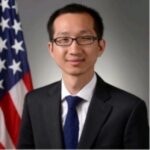Wednesday, November 20, 2024 from 12:00PM – 1:30PM (EDT)
In-person and Webcast
Event Description:
The Global Taiwan Institute (GTI) is pleased to invite you to a panel discussion titled “Taiwan Policy After the 2024 US Elections.”
On November 5, 2024, the United States held national elections that saw former President Donald Trump re-elected as the 47th president of the United States,as well as a shift in the power dynamics within the US Congress. In a period of global disruptions, these results could have significant implications for US-Taiwan relations. Like other allies and partners, Taiwan faces pressing questions on how the president-elect’s policy might shift relations across the diplomatic, economic, and security realms as compared to prior administrations. Please join GTI’s distinguished group of senior fellows as they consider potential impacts on multiple fronts, from diplomatic and trade policy to security implications and defense commitments. Additionally, this event will examine China’s assessment of the election results, and its anticipated policy responses. The discussion will also explore the 119th Congress’s likely role in shaping Taiwan policy, given its critical influence through the Taiwan Relations Act. This timely event will offer insights into what may lie ahead for cross-Strait relations and how Taiwan might navigate the next four years in light of US political changes.
The event will be held at GTI’s office located at 1836 Jefferson Place NW in Washington DC (approximately one block from the Dupont Circle Metro). Doors will open at 11:30 AM, and the event will begin at 12:00 PM. Please direct questions or concerns to Program Manager Adrienne Wu at awu@globaltaiwan.org.
**Media: Please contact Adrienne Wu at awu@globaltaiwan.org if you would like to bring additional crew members or equipment, so that we can be sure to accommodate you.
The Panelists:
Ann E. Kowalewski is a senior non-resident fellow at the Global Taiwan Institute. She has a decade of experience in think tank, government, and private sector on Indo-Pacific policy. Annie led the Indo-Pacific portfolio as a senior professional staff member of the House Foreign Affairs Committee, where she managed legislation and oversight regarding strategic competition with the People’s Republic of China (PRC), US policy towards Taiwan, alliance management, and the US diplomatic and security posture in the region. She also served as an Indo-Pacific senior policy analyst on the Senate Foreign Relations Committee for three years., where she managed legislation and oversight regarding strategic competition with the People’s Republic of China (PRC), US policy towards Taiwan, alliance management, and the US diplomatic and security posture in the region. She also served as an Indo-Pacific senior policy analyst on the Senate Foreign Relations Committee for three years.
Eric Chan is a senior non-resident fellow at the Global Taiwan Institute. He has published widely on Chinese influence operations/information warfare, Taiwan military reform, and the strategic balance in East Asia. He has written for publications including the USAF Journal of Indo-Pacific Affairs, the US Army War College Quarterly Parameters, The Diplomat, War on the Rocks, and the Global Taiwan Brief. Mr. Chan was previously the China, Korea, Philippines, and Vietnam Country Director at the Secretary of the Air Force, International Affairs (SAF/IA). In this role, Mr. Chan was responsible for US Air Force military engagement with the PLA Air Force, and for directing security cooperation with key allies and partners. Mr. Chan has also served as an analyst for the US Air Force Deputy Chief of Staff for Strategic Deterrence and Nuclear Integration (HAF/A10), providing expertise on PRC nuclear doctrine.
Riley Walters is a senior non-resident fellow with the Global Taiwan Institute and senior fellow at Hudson Institute. His areas of expertise include international trade policy, investment regulations, technology and innovation, cybersecurity, and the intersection of economics and national security. He is also an expert on east Asian political affairs, primarily focusing on Japan and Taiwan. Riley was formerly the senior policy analyst and economist in The Heritage Foundation’s Asian Studies Center. He is also formerly a Penn Kemble Fellow with the National Endowment for Democracy, George C. Marshall Fellow with The Heritage Foundation, Mosaic Taiwan Fellow with Taiwan’s Ministry of Foreign Affairs, National Security Fellow with the Foundation for Defense of Democracies, and Kim Koo Fellow with the Korea Society.
Michael Mazza is a senior non-resident fellow at GTI. He is also a senior director at the Project 2049 Institute, as well as a non-resident fellow in foreign and defense policy studies at the American Enterprise Institute (AEI), where he analyzes US defense policy in the Asia-Pacific region, Chinese military modernization, cross-Strait relations, Korean Peninsula security, and US strategy in Southeast Asia. Mr. Mazza has contributed to numerous AEI studies on Asian security issues. He was recognized as a 2010-2011 Foreign Policy Initiative Future Leader.
The Moderator:
Russell Hsiao is the executive director of GTI, senior fellow at The Jamestown Foundation, and adjunct fellow at Pacific Forum. He is a former Penn Kemble fellow at the National Endowment for Democracy and visiting scholar at the University of Tokyo’s Institute for Advanced Studies on Asia. He previously served as a senior research fellow at The Project 2049 Institute and national security fellow at the Foundation for Defense of Democracies. Prior to those positions he was the editor of China Brief at The Jamestown Foundation from October 2007- to July 2011 and a special associate in the International Cooperation Department at the Taiwan Foundation for Democracy. While in law school, he clerked within the Office of the Chairman at the Federal Communications Commission and the Interagency Trade Enforcement Center at the Office of the U.S. Trade Representative. Mr. Hsiao received his J.D. and certificate from the Law and Technology Institute at the Catholic University of America’s Columbus School of Law where he served as the editor-in-chief of the Catholic University’s Journal of Law and Technology. He received a B.A. in international studies from the American University’s School of International Service and the University Honors Program.





